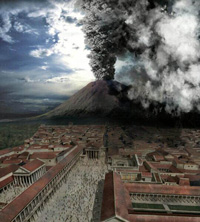News from Canada, Italy and China
Tuesday's World Events — Posted on February 12, 2013
CANADA – Government begins to phase out one-cent coin after calling it a costly nuisance
 TORONTO | Canada has begun phasing-out its penny, whose production costs have come to exceed its monetary value.
TORONTO | Canada has begun phasing-out its penny, whose production costs have come to exceed its monetary value.
The Royal Canadian Mint on Monday, Feb. 5, officially ended its distribution of one-cent coins to financial institutions.
While people may still use pennies, the government has issued guidelines urging store owners to start rounding prices to the nearest nickel for cash transactions. Electronic purchases will still be billed to the nearest cent.
New Zealand, Australia, the Netherlands, Norway, Finland, Sweden and others have also dropped the penny.
Google is marking the passing of the penny with a dedicated doodle on its Canadian home page.
ITALY – Pompeii begins $141 million facelift
ROME | A $141 million restoration project got under way at the ancient Roman city of Pompeii, after years of structural collapses and general neglect.
The money – much of it from the European Union – will be put toward strengthening crumbling Roman villas, restoring damaged frescoes and improving video surveillance at the site, in the shadow of Mt Vesuvius. …
The work at Pompeii will be overseen by a committee of Italian officials and European Union representatives to ensure that the funds are not misspent.
Pompeii, which was buried in ash and lava when Mt Vesuvius erupted in AD79, attracts more than 2.5 million tourists a year and is Italy’s second most visited attraction after the Colosseum in Rome.
The ash helped preserve the town’s villas, market places, paved streets and temples, which were excavated from the 18th century onwards.
Those archaeological wonders have been compromised by years of mismanagement and lack of funds, with many areas off-limits to the public or covered in rusted scaffolding and tattered plastic fencing. …
CHINA – Fewer New Year fireworks in polluted Beijing

Fireworks illuminate the skyline to celebrate Chinese Lunar New Year of Snake and cause severe air pollution on February 9, 2013 in Beijing, China.
BEIJING | The annual Lunar New Year fireworks barrage in Beijing was notably muted following government appeals to reduce the smoky celebrations after air pollution rose to near catastrophic levels over recent weeks. …
China’s capital saw almost twice the number of smoggy days as usual in January, with levels of small particle air pollution going off the charts at times. That prompted calls for restraint, along with a reduction in the number of licensed fireworks sellers and the amount of fireworks on sale. …
Setting off fireworks to celebrate renewal and ward off evil spirits is a traditional part of the celebration that marks China’s most important family holiday.
Sales of fireworks from Tuesday to Saturday fell 37 percent over the same period last year, from 410,000 cartons to just 260,000, the official Xinhua News Agency reported, citing figures from thecity government. The city authorized 1,337 fireworks stands this year, down from 1,429 last year, and allowed 750,000 cartons of fireworks to go on sale, down from 810,000. …
Beijing was largely helpless in the face of the January smog, while schools canceled outdoor activities, some factories closed and government cars were ordered off the streets. Scores of people, especially the young and elderly, were treated at hospitals for respiratory problems, elevated blood pressure and heart complaints.
Last year’s fireworks display created a thick haze that sent 2.5 microgram pollution levels as high as 1,500. …
Beijing permits fireworks displays over a 16-day period surrounding the Lunar New Year, but largely restricts them to suburban areas outside the densely populated city center.
The holiday will continue through the week, with government and businesses shut down and millions of Chinese traveling to their home towns to visit family. …
(The news briefs above are from wire reports and staff reports posted at Fox News on Feb. 4, London’s Daily Telegraph on Feb. 6 and YahooNews on Feb. 10.)
Questions
1. For each of the 3 countries, give the following information:
a) location/the countries that share its borders
b) the religious breakdown of the population
c) the type of government
d) the chief of state (and head of government if different) [If monarch or dictator, since what date has he/she ruled? - include name of heir apparent for monarch]
e) the population
[Find the answers at the CIA World FactBook website. For each country, answers can be found under the "Geography" "People" and "Government" headings. Go to worldatlas.comfor a list of continents.]
2. For CANADA:
a) list the who, what, where and when of the news item
b) Why has the Canadian government made this decision?
c) How is the government asking store owners to adjust prices to address the end of the penny?
d) Do you support this idea? Why or why not?
e) What other countries have also phased out the penny?
f) In 2012, the U.S. Mint reported that each penny made "costs the U.S. federal government 2 cents." The estimated cost to the Canadian government for making pennies was 1.6 cents. Do you think the U.S. should phase out the penny? Why or why not?
3. For ITALY:
a) list the who, what, where and when of the news item
b) Why do you think it is important to preserve the city of Pompeii?
4. For CHINA:
a) list the who, what, where and when of the news item
b) Why do you think China's cities have such a severe air pollution problem?
Background
CANADA:
Cash transactions in Canada will now be rounded to the nearest 5-cent mark. The penny's retirement will have no effect on payments made by checks or credit cards.
For example, if the total price of coffee and a sandwich is $4.92, a customer that was paying in cash would owe $4.90, according to the Royal Canadian Mint. But those using another method of payment would pay $4.92, and the pennies would be tallied electronically.
The cost of the metal that goes into a penny has surged in recent years, making the coin's production more expensive than its face value.
In the U.S., it now cost 2.41 cents to make every penny, which is made mostly of zinc. The penny has cost more than its face value since 2006.
Although the U.S. has conducted significant research into alternatives for the penny, the U.S. Mint says it still needs more research before it can make a decision to either change its composition or do away with it altogether.
Any new materials for the penny would need to simulate the current look and durability of the nation's most circulated coin. (from chicagotribune.com)
ITALY: WHAT IS POMPEII?
- Pompeii is a partially buried Roman town-city near modern Naples, Italy.
- Along with Herculaneum, its sister city, Pompeii was destroyed and completely buried during a long catastrophic eruption of the volcano Mount Vesuvius spanning two days in 79 AD.
- The eruption buried Pompeii under 4 to 6 meters of ash and pumice, and it was lost for over 1,500 years before its accidental rediscovery in 1599.
- Since then, its excavation has provided an extraordinarily detailed insight into the life of a city at the height of the Roman Empire. (from wikipedia)
CHINA: WHAT IS CHINESE NEW YEAR?
- Chinese New Year is the longest and most important celebration in the Chinese calendar. The Chinese new year began on Feb. 10, 2013.
- New Year festivities traditionally start on the first day of the month and continue until the fifteenth, when the moon is brightest.
- In China, people may take weeks of holiday from work to prepare for and celebrate the New Year.
- Legend has it that in ancient times, Buddha asked all the animals to meet him on Chinese New Year. Twelve came, and Buddha named a year after each one. He announced that the people born in each animal’s year would have some of that animal’s personality. Chinese New Year 2013 is the Year of the snake. Many Chinese people regard 2013 as a good year because it is right after the auspicious Year of the Dragon.
- At Chinese New Year celebrations people wear red clothes, decorate with poems on red paper, and give children “lucky money” in red envelopes. Red symbolizes fire, which according to legend can drive away bad luck.
- The fireworks that shower the festivities are rooted in a similar ancient custom. Long ago, people in China lit bamboo stalks, believing that the crackling flames would frighten evil spirits.
- In China, the New Year is a time of family reunion. Family members gather at each other’s homes for visits and shared meals, most significantly a feast on New Year’s Eve.
- The lantern festival is held on the fifteenth day of the first lunar month. Some of the lanterns may be works of art, painted with birds, animals, flowers, zodiac signs, and scenes from legend and history. People hang glowing lanterns in Buddhist temples, and carry lanterns to an evening parade under the light of the full moon.
- In many areas the highlight of the lantern festival is the dragon dance. The dragon-which might stretch a hundred feet long-is typically made of silk, paper, and bamboo.
- Traditionally the dragon is held aloft by young men who dance as they guide the colorful beast through the streets. In the United States, where the New Year is celebrated with a shortened schedule, the dragon dance always takes place on a weekend. In addition, many Chinese-American communities have added American parade elements such as marching bands and floats. (from infoplease.com)

